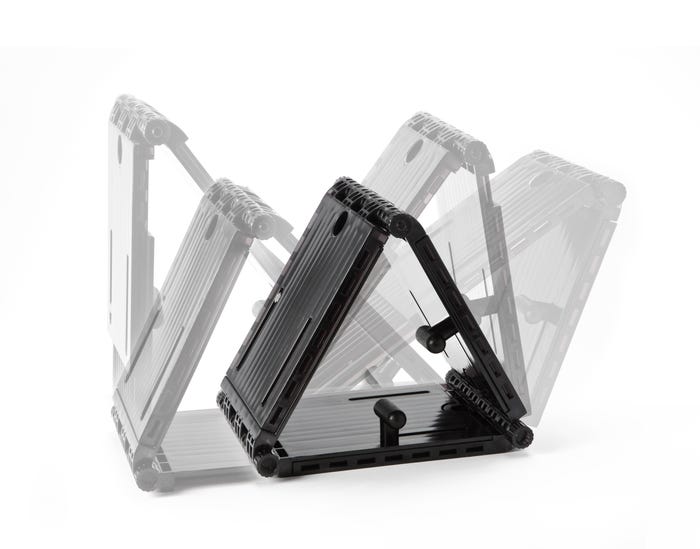Solvay’s Radel polyphenylsulfone enabled development of the first fully adjustable plastic positioning support for orthopedic trauma surgery
September 20, 2011
Designed for universal positioning for intramedullary (IM) nailing, plating, and external-fixation applications, the Bender triangle is the industry's first fully adjustable plastic positioning support for orthopedic trauma surgery. To achieve this medical device design feat, however, manufacturer Tri-Medics LLC (Foxboro, MA) required a high-performance polymer in order to offer a more cost-effective and less-complex positioning support than existing fixed foam rubber or metal versions. A Radel polyphenylsulfone (PPSU) resin supplied by Solvay Specialty Polymers (Alpharetta, GA) proved to be the right material for the job.
|
Made almost entirely from Radel PPSU, the Bender triangle is a cost-effective, simple alternative to fixed metal and foam rubber positioners. |
Adjustable to the human anatomy, the Bender triangle is designed so that orthopedic surgeons can configure the device at any angle or height and either as a single unit or segmented for optimal positioning of patient extremities for a given procedure. As a result of this flexibility, the Bender triangle helps to simplify procedures and decrease operating room time, according to Bradley Bender, Tri-Medics president and inventor of the patented device.
Although the adjustable nature of the device was the key design focus to differentiate the product in the marketplace, material selection was critical to the success of the orthopedic trauma device. Realizing this, Tanaka Kapec Design Group (Norwalk, CT), an industrial design and product development firm that partnered with Tri-Medics on the Bender triangle project, contacted Solvay for a material recommendation. Based on the application requirements, Solvay suggested the use of the Radel R PPSU.
Critical to the application was that the polymer could withstand IM nailing of the femur and tibia and other manipulative actions. "You have to first consider impact resistance for this application," states Gilbert Galon, sales development manager at Solvay. "With the Bender triangle, [surgeons] put the knee on top of the device and perform a surgical procedure, so high strength is needed. The Izod impact of this Radel R material per ASTM D256 is 13 ft-lb/in."
In addition to high strength, the blue-tinted thermoplastic was also selected for its good chemical resistance, which, according to Galon, is far superior to that of several competing polymers. It can also withstand up to 1000 autoclave cycles without warping, effectively maintaining its toughness and impact resistance. Furthermore, the PPSU is radiolucent, enabling x-ray use, and features a heat-distortion temperature of 207°C as well.
Radel PPSU also boasts ease of processing, which facilitated development of the finished product. Consisting of three injection-molded sides and three pivot corners, the completed Bender triangle is engineered entirely from Radel PPSU, with the exception of six stainless-steel nuts.
"This one-of-a-kind device gives surgeons a broader view as well as greater control and precision," Bender of Tri-Medics says. "Radel PPSU played a major role by delivering high strength and radiotranslucence."
You May Also Like



